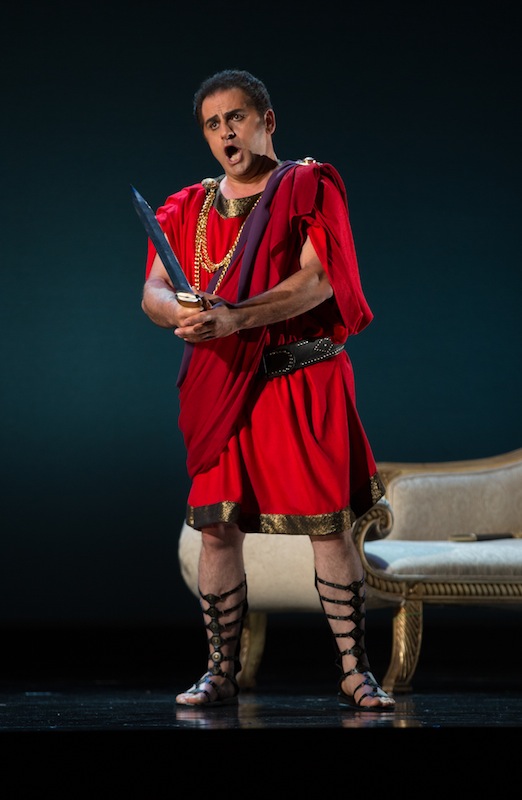Odyssey Opera makes a strong vocal case for Mozart’s problematic “Lucio”

Yeghishe Manucharyan in the title role of Mozart’s “Lucio Silla” at Odyssey Opera. Photo: Kathy Wittman
It’s a move unheard of for any despotic ruler.
Lucio Silla (Lucius Sulla), dictator of Rome, steps down from power after feeling a sudden sweep of compassion and allows his beloved Giunia to be with her husband, the exiled Roman senator Cecilio. And Cinna, who plotted to murder Silla, is ultimately rewarded with the hand of Celia, the dictator’s sister. As Silla put it in the end, love ultimately triumphs over power and false glory.
That’s the strange and contrived finale of Mozart’s opera Lucio Silla, which opened at the Boston University Theatre Wednesday night in a thrilling production given by Odyssey Opera.
That ending aside, Lucio Silla was a remarkable achievement for the sixteen-year-old Mozart. The music is ear-catching, and the drama is packed with colorful and memorable arias. In all, the work stands as the greatest of the composer’s early operas.
Giovanni de Gamerra’s libretto unfolds in mostly personal rather than political conflict. Silla is portrayed as a bloodthirsty ruler and notorious womanizer, who, in some productions, even puts moves on his own sister. But he desires Giunia, the daughter of his dead and defeated enemy, Marius. A plot by her husband Cecilio, Cinna, and, ultimately, Giunia herself promises to end Silla’s reign and restore liberty to Rome, with the rightful lovers reunited.
The opera was a fine vehicle for Odyssey Opera’s production team. Isabel Milenski’s stage direction was fluid and did a superb job telling the story. Sets, designed by Jian Jung, were simple but effective, with grey and black walls draped with a curtain stage right to allow for occasional shadow play. Pillars and chairs adorned the set to make a blank canvas for flowered trees and Seth Bodie’s Romanesque costumes, which added a splash of red, pink, green, and blue.
The opera’s characters tend to be one dimensional and driven by only a few emotions, but Mozart’s brilliant vocal writing creates a beating heart for this problematic work. The singing, which featured a starry cast, was consistently excellent.
As Silla, Yeghishe Manucharyan sang with a bell-toned tenor that was especially strong in his Act 1 aria “Il desío di vendetta, e di morte,” his voice resonating with a vengeance that bordered on madness. (His acting, though, didn’t quite sell the scene, as he childishly knocked over a rose tree with his sword.) In Act 2, his character is torn ever more between love and vengeance, and Manucharyan delivered his recitatives with sensitivity to show the softer side of the dictator.
As Giunia, soprano Katy Lindhart brought a tinge of anger and palpable sorrow to the role. Giunia has a deep hatred for Silla, yet she is also consumed by grief. Lindhart’s most sweetly sorrowful singing came with “Fuor di queste urne dolente,” her aria at her father’s grave.
Michael Maniaci brought a ripe, smooth-toned countertenor to the role of Cecilio, capturing the love-driven character to stellar effect. His voice flowered beautifully in the upper range, and he and Lindhart spun silky lines around each other in their graveside duet. “Pupille amate” was especially gorgeous with both singers giving their final farewells with poignant intensity.
As Cinna, soprano Joanna Mongiardo sang with rosy tone and fluent control of Mozart’s florid line in the character’s opening aria, “Vieni ov’ amor t’inita.” Sara Heaton brought a rich, full soprano voice to the role of Celia, her acting capturing well the character’s flirtatious personality, and tenor Omar Najmi sang with strength and fine technical polish in his too-brief role as Aufidio, a tribune and friend of Silla.
The chorus sang with plush tone and fine corporate blend in its featured numbers at Marius’ graveside and opera’s conclusion. The beautiful singing from cast and chorus still couldn’t save the ending, which is so sudden and unexpected that it borders on the comic, an unfortunate trait in a number of opera seria works such as this one.
In the pit, conductor Gil Rose kept the tempos brisk, leading playing of soft delicacy to capture the effervescent nature of Mozart’s music.
Lucio Silla will be repeated 7:30 p.m. Friday and 3 p.m. Sunday at the Boston University Theatre. odysseyopera.org
Posted in Performances




